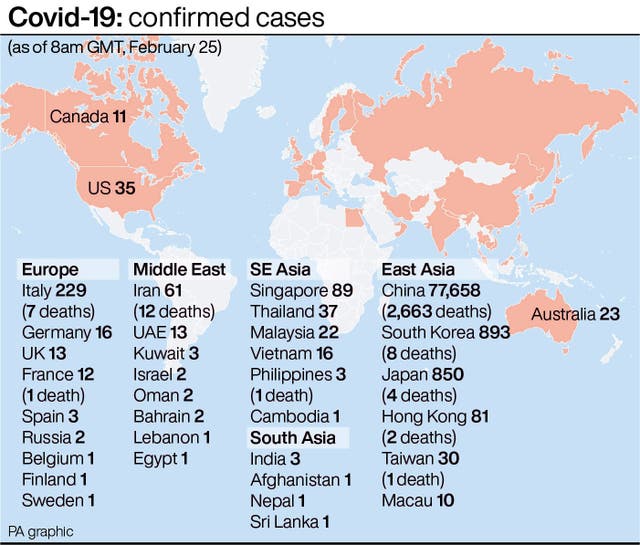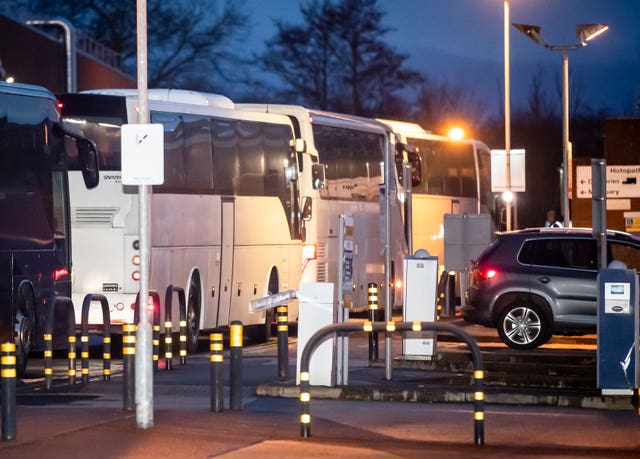
Travellers returning to the UK from northern Italy may need to self-isolate as part of measures to stop the spread of coronavirus, ministers have said.
Health Secretary Matt Hancock said official advice, updated on Tuesday, has been changed to say that those who have been to northern Italy – north of Pisa – should self-isolate if they develop flu-like symptoms on their return to the UK.
Covid-19 disease, caused by coronavirus, is causing a range of symptoms including a fever, cough or sore throat.
Meanwhile, Britons who have been in lockdown regions of Italy – including those in the Lombardy and Veneto region – should self-isolate at home for 14 days even if they have no symptoms, Mr Hancock said.
Speaking on BBC Breakfast, he said: “If people have been to the affected areas that the Italian government have quarantined then they should self-isolate whether or not they have symptoms.”
Any Britons who are still in lockdown regions of Italy should stay indoors and follow public health advice from Italian authorities, the Foreign Office has said.
The advice comes as the Department of Health added Iran, Vietnam, Cambodia, Laos, Burma, and those parts of northern Italy (including lockdown areas) to the list of places where travellers need to follow clinical advice.
 (PA Graphics)
(PA Graphics)
In Italy, police have manned checkpoints around a dozen quarantined northern towns as 229 people have tested positive for coronavirus and seven have died,
Schools were closed, theatre performances cancelled, and Venice Carnival celebrations were called off, while producers said filming on the latest Mission: Impossible movie starring Tom Cruise has been halted.
Mr Hancock said the Government was not aware of any Britons who were in the quarantined areas of northern Italy, but he urged anyone there to make contact with the embassy in Rome.
The minister added that there were no changes to travel advice about going to Italy but those returning and showing symptoms should self-isolate.
He added: “In terms of going to Italy as a whole we haven’t changed that travel advice.
“But we are clear that, if you come back from northern Italy and you have symptoms, then you should self-isolate.”
Stigma can:
🔹 Drive people to hide the illness to avoid discrimination🔹Prevent people from seeking health care immediately🔹Discourage them from adopting healthy behaviourshttps://t.co/7kH9y0NViC #COVID19 #coronavirus pic.twitter.com/IIn1fFXyR5
— World Health Organization (WHO) (@WHO) February 25, 2020
The new travel advice comes as World Health Organisation (WHO) director-general Tedros Ghebreyesus warned that, while the spread of the virus around the world is not yet at pandemic stage, it has the potential to become one.
But Mr Hancock said the UK has done a “huge amount” of work preparing in case coronavirus became a pandemic, including setting up testing facilities outside A&Es and preparing home testing kits.
He added: “Since the outbreak became public at the start of this year, we have been doing a huge amount of work to prepare in case this becomes a pandemic.
“Once it gets to that point there isn’t a way to stop it coming into the UK in a big way.
“It is not yet clear that it will become a pandemic – the number of cases in China has been slowing over the last couple of weeks and we are relatively confident that information is correct.
“Now there are more cases outside China, but at the moment if those countries get their response right and get the numbers coming down as China has then there still is the possibility this is a relatively small outbreak in the UK.
“We still expect more cases but at the moment there are 13 cases in the UK.”
Scotland’s chief medical officer Catherine Calderwood said people could be banned from gathering in large numbers to contain the virus.
Speaking to BBC Good Morning Scotland, she said the Government and the NHS were working on “containment first”, but if a cluster of cases was found then a range of measures would be used to try to limit the number of people infected.
She added: “If we do have a cluster, as has happened in Italy, then we move into delaying the spread.
“Delaying the spread would mean some of the measures that have happened already in Italy – stopping people coming together in large groups so that one or a few individuals do not spread to many, many more around them.”
In the UK, 13 people have been diagnosed with Covid-19 caused by the virus, including four over the weekend who had been on the Diamond Princess cruise ship that was held in quarantine in Japan.
 Coaches carrying passengers repatriated to the UK from the Diamond Princess cruise ship arrive at Arrowe Park Hospital (Danny Lawson/PA)
Coaches carrying passengers repatriated to the UK from the Diamond Princess cruise ship arrive at Arrowe Park Hospital (Danny Lawson/PA)
The four Britons from the cruise ship are being treated at specialist centres and were among a group of 30 Britons and two Irish citizens who arrived at a quarantine block at Arrowe Park Hospital in Merseyside on Saturday.
Two of the patients are in the Royal Hallamshire Hospital in Sheffield, one is in the Royal Liverpool University Hospital and a fourth was taken to the Royal Victoria Infirmary in Newcastle.
The London stock market steadied after Monday’s dramatic falls on fears over the spread of coronavirus, with the FTSE 100 Index remaining largely flat after its 3.3% tumble in the previous session.
But experts warned of further shares pain to come as the outbreak rages on and the full scale of the global economic impact becomes clearer.
Meanwhile, an Italian man, believed to be a doctor, has tested positive for coronavirus in Tenerife, it has been reported.
The Canary Islands’ health authorities confirmed in a statement that the man is being kept in isolation and his test results will be sent to Madrid for a second analysis.
A letter sent to guests, seen by the BBC, says: “We regret to inform you that for healthy (sic) reasons, the hotel has been closed down. Until the sanitary authorities warn, you must remain in your rooms.”
China reported 508 new cases and another 71 deaths on Tuesday, 68 of them in the central city of Wuhan, where the epidemic was first detected in December.
The updates bring mainland China’s totals to 77,658 cases and 2,663 deaths, while South Korea now has the second highest number of cases in the world with 893 and eight deaths.


Comments: Our rules
We want our comments to be a lively and valuable part of our community - a place where readers can debate and engage with the most important local issues. The ability to comment on our stories is a privilege, not a right, however, and that privilege may be withdrawn if it is abused or misused.
Please report any comments that break our rules.
Read the rules hereLast Updated:
Report this comment Cancel